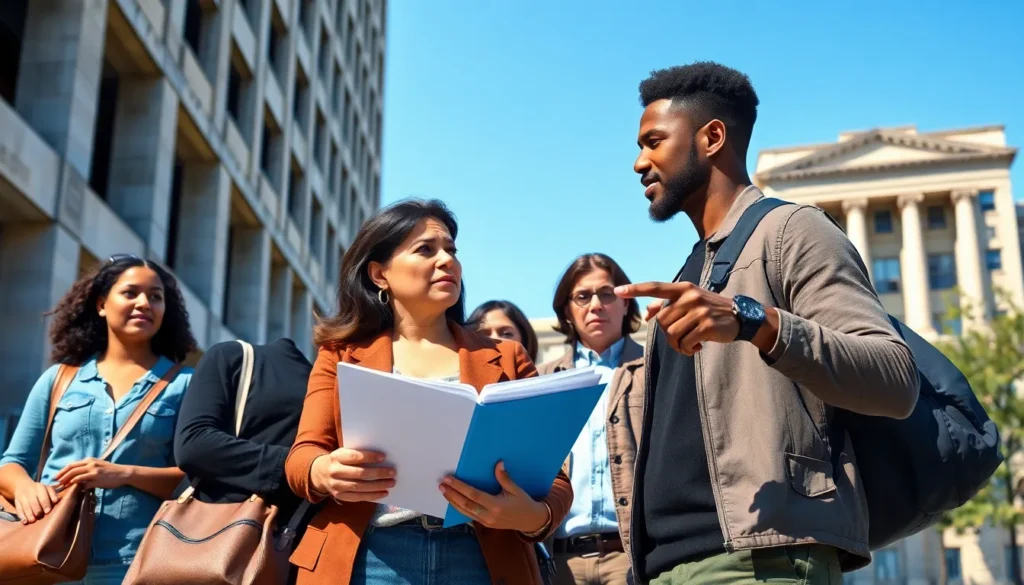Table of Contents
ToggleRenewing residency can feel like navigating a maze blindfolded, but understanding the costs doesn’t have to be a riddle wrapped in an enigma. Whether you’re a seasoned resident or a newbie trying to figure out the paperwork jungle, knowing how much it’ll set you back is crucial. Spoiler alert: it’s not just about the fees; it’s about keeping your dreams alive without breaking the bank.
Overview of Residence Renewal Costs
Renewing residency incurs various costs that residents must understand. Application fees typically range from $200 to $500, depending on the specific residency type. Additional expenses may arise, such as legal fees, which can vary widely based on representation needs.
Government processing fees also influence total costs. These fees generally fall between $100 and $300, adding to the overall expenditure. Healthcare requirements for some residency types necessitate financial planning, as medical examinations can cost around $200.
Furthermore, documentation costs play a crucial role in the renewal process. Residents might need to obtain new identification, birth certificates, or marriage certificates, which can total up to $100.
Travel expenses for interviews or appointments often arise. Depending on the distance, these costs can contribute significantly to the overall budget.
In some cases, translation services may be necessary for documents not in English. These services usually range from $20 to $50 per page, adding to the financial considerations.
Being aware of these variances allows residents to prioritize their budgets effectively. Understanding the total cost structure of residency renewal reduces unexpected financial burdens. Accurate financial preparation involves accounting for all potential expenses, ensuring clarity in what residents can expect throughout the renewal journey.
Factors Influencing Renewal Fees

Costs associated with residency renewal vary based on several factors. Understanding these fees helps in planning for the renewal process.
Application Fees
Application fees typically range from $200 to $500, depending on several variables. Variations in fee amounts can occur based on residency type or individual’s circumstances. Applicants may also face additional fees that arise from specific cases. Knowing the anticipated application fee allows residents to budget appropriately for their renewal.
Legal and Consultation Fees
Legal and consultation fees contribute significantly to overall renewal costs. These fees can vary widely, often ranging from $100 to $1,500 based on the complexity of the individual case. Engaging a legal expert might prove beneficial, but it’s wise to assess whether such an expense is necessary. Residents should factor these potential costs into their budget to avoid surprises during the renewal process.
Steps to Renewing Your Residence
Renewing residency requires a clear understanding of the application process and required documentation. Each step plays a crucial role in ensuring a smooth renewal experience.
Application Process
Start by completing the application form accurately. Fees typically range from $200 to $500, depending on the residency type. After submitting the form and payment, expect a processing period. Follow up as needed to ensure timely progress. If a legal expert is involved, their role may streamline this process but could add additional fees between $100 and $1,500. Applicants often encounter interviews, so prepare accordingly. In certain cases, specific timelines may affect eligibility for renewal.
Required Documentation
Gather necessary documents early to avoid delays. Essential items often include identification, proof of residency, and medical examination results. Obtaining these documents can cost up to $100. Translation services for non-English documents might add between $20 to $50 per page to the budget. Ensure all paperwork is organized and complete before submission. Recommendations suggest having duplicates of critical documents for interviews. Depending on individual circumstances, additional documents may be required, so reviewing requirements in advance is wise.
Potential Hidden Costs
Renewing residency often involves unexpected expenses. Legal representation might be necessary, and fees for these services range from $100 to $1,500. Applicants must also consider the costs of additional documentation. Certification and identification can add up to $100, which is important to budget for.
Medical examination fees typically average around $200. These costs are essential for healthcare requirements that may accompany residency renewal. Translation services carry their own costs, adding $20 to $50 per page for non-English documents. This detail is crucial for those who need to submit translated materials.
Travel expenses can also lead to financial surprises. Commuting to interviews and additional meetings might incur extra costs that applicants often overlook. Understanding these potential hidden costs allows applicants to prepare a comprehensive budget.
Consultation fees can vary widely based on case complexity. While engaging a legal expert may provide peace of mind, residents should weigh this option against their financial situation. Prioritizing expenses ensures that residents can meet their financial obligations without unexpected burdens.
It’s advisable for applicants to anticipate variations in residency renewal fees. Comparing individual cases helps determine the financial commitment necessary for a successful renewal process. By remaining informed about these hidden costs, residents can navigate the renewal journey with greater confidence.
Tips for Reducing Renewal Expenses
Consider exploring options for financial assistance based on residency status before initiating the renewal process. Research potential discounts available through local organizations or community resources that assist residents.
Keeping documentation organized helps minimize costs related to additional requirements for visas and permits. Utilize online resources to gather necessary information, which can reduce the need for costly legal consultations.
Evaluate the necessity of hiring a legal expert; sometimes, individuals can navigate the application process independently. Checking official government websites for application forms and guidance saves on potential consultation fees.
Look for bundled services that offer document translation and preparation at a reduced rate. This approach can significantly lower per-page translation costs, which typically range from $20 to $50.
Prepare for the medical examination in advance by scheduling appointments early. This action avoids last-minute rush fees and ensures timely processing of medical results.
Be aware of hidden costs, such as travel expenses for interviews. Planning ahead for transportation can lead to savings, as commuting distances may vary based on location and availability of public transit.
Inspect application fees closely for specific residency types, since some categories may offer reduced fees or waivers. Understanding these distinctions is crucial in budgeting for renewal expenses.
Remember to compile duplicates of essential documents to avoid reprinting costs, such as identification and residency proof. This practice not only saves money but also expedites the renewal process.
Renewing residency can be a complex journey filled with various costs and requirements. Understanding these financial aspects is crucial for effective budgeting and avoiding unexpected expenses. By staying informed about application fees legal costs and potential hidden charges residents can approach the renewal process with greater confidence.
It’s essential to plan ahead gather necessary documentation and evaluate the need for legal assistance. Taking advantage of available resources and exploring financial aid options can also alleviate some of the financial burdens. With careful preparation and awareness residents can navigate their renewal journey successfully while minimizing costs.







